Improve Your Writing by Watching TV (Part 2)
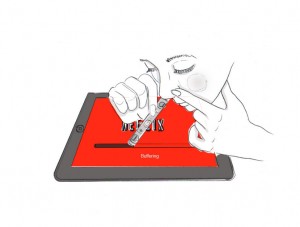
I’ve watched/begun watching a whole bunch of shows since the first list, which can be found here. Damn Netflix. Damn binge watching. Damn my everlasting quest to find the perfect tale.
My top show remains, without a doubt, Breaking Bad. I believe it had a complete story to tell, the creators sat down and methodically plotted it all out, and then they let it unfold naturally. There were four and a half seasons, which seems to be the sweet spot for drama series (humor/satire seems to be the exception). Any longer, and the writers just wind up stretching the material. This was the case for Dexter. After season 4, the story seemed to drag. Seems to be the case with most shows. That’s when the shift from quality to quantity usually becomes evident. What can be said? The inevitable pursuit of the almighty cash cow eventually ruins everything.
Looking back at my list, I couldn’t help but shake my head and sigh, because I ceased watching The Walking Dead (one of my previous favorite shows) a few episodes into season 5. It’s sad, really, because I’ve read the graphic novels, and I know there’s enough story to push this series to season 7 or 8 while maintaining its freshness. Unfortunately, the characters have become stagnant. Worse yet, the show has departed from what made the original so great—an unrepentant willingness to slay its own children. The show refuses to follow this path. Why? Feels like they’re more worried about the draw of the show over the quality. As if they were to kill a main, likable actor or actress, they’d lose a million viewers or something. Hell if I know.
Another show which fell off the rails for me was American Horror Story. Despite several unnecessary ingredients tossed into the pot (the Devil, aliens?), Asylum conjured up some true horror in the form of a demented Nazi-esque doctor ruthlessly experimenting on victims who couldn’t escape. It was a nice clash of religion vs. science. But then Coven came around, and it felt like the show was trying to one-up its own weird factor. I had to stop watching after a few episodes, because I can forgive a lot of things, but shit just wasn’t making any sense. I heard Freak Show was a bit of a letdown, which is disappointing, especially because I’d like to watch it, but it’s rough for a series once it shows signs of decline, because there’s so much else out there to choose from.
Which leads me into a new list of shows I’d like to share. While none are perfect, each can definitely help authors hone their craft when it comes to their own work. So, let’s dive right in.
The Flash
 This has become one of my top two favorite, new series. It’s come closest to giving me the same feels Breaking Bad once did. Yes, it’s that good. Hear me out.
This has become one of my top two favorite, new series. It’s come closest to giving me the same feels Breaking Bad once did. Yes, it’s that good. Hear me out.
While the weekly villains can be somewhat mediocre to downright cringe worthy, the overall emotion The Flash evokes in just its first season is insane. Which brings me to:
What can you learn?
—Character Development/Purpose
—Pacing
—Emotional Buildup
I never liked Flash. He could run fast, so what? He was on a team with Superman, you know, a dude who possessed a laundry list of ridiculously OPed super powers, including the ability to fly faster than Barry could ever hope to run (at least that’s what I thought).
Right off the bat, The Flash had a lot to prove. I think the creators knew this, which is why they put the focus on developing the human side of Barry. It’s what makes his character great—why did he decide to use his power for good? I’ll say this: Barry’s mysterious past is weaved flawlessly with a plot which takes off right from the pilot and hardly ever seems to lose steam.
Once Barry’s struggle becomes clear and we’re able to see the world through his eyes, it’s impossible not to root for the guy. He’s kind, always willing to put others’ needs before his own, and best of all, he has this burning desire to fix everything. No loose ends. No victims. Barry Allen just wants a utopia.
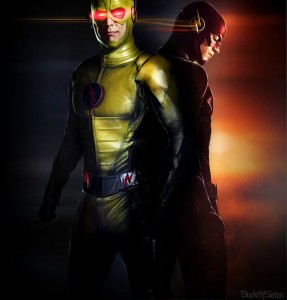 This dilemma is what really elevates the show to another level. I don’t want to spoil the story for those who haven’t watched, but Barry’s wonderfully developed character eventually meets his ultimate match—and no, it’s not necessarily a villain—it’s a decision. Most shows like to write their characters to a happy ending so they get to indulge in the spoils of war. But not here. Barry has an impossible choice to make as the season nears its end. And it’s not a choice which randomly pops up in the penultimate episode. It’s a choice we learn early on in the season (which runs 23 episodes) he’s ultimately going to have to make. So that looming decision hangs over each of us as The Flash fights these tiny battles, and in the back of our minds, we can’t help but yearn for the answers which the show runners dangle over us, thus creating an insane amount of building tension.
This dilemma is what really elevates the show to another level. I don’t want to spoil the story for those who haven’t watched, but Barry’s wonderfully developed character eventually meets his ultimate match—and no, it’s not necessarily a villain—it’s a decision. Most shows like to write their characters to a happy ending so they get to indulge in the spoils of war. But not here. Barry has an impossible choice to make as the season nears its end. And it’s not a choice which randomly pops up in the penultimate episode. It’s a choice we learn early on in the season (which runs 23 episodes) he’s ultimately going to have to make. So that looming decision hangs over each of us as The Flash fights these tiny battles, and in the back of our minds, we can’t help but yearn for the answers which the show runners dangle over us, thus creating an insane amount of building tension.
Sure, there’s some unnecessary drama tossed into the mix and a few forgettable side characters, but the season as a whole definitely knows where it’s going. It’s a nice change of pace from shows which tend to wander around, hoping for a plot to arise. And while most seasons tend to lag in the middle, The Flash blindsided me with one of the greatest episodes I’ve ever seen (yes, for any show). I’m not ashamed to admit that I even cried a bit.
Silicon Valley
![]() This is my other favorite, new series. It’s got Frank from Big Hero 6. You know, T.J. Miller? From Transformers 4: Age of Extinction? How to Train Your Dragon 1 & 2? Cloverfield?
This is my other favorite, new series. It’s got Frank from Big Hero 6. You know, T.J. Miller? From Transformers 4: Age of Extinction? How to Train Your Dragon 1 & 2? Cloverfield?
He’s a “that-guy”, okay, but he’s hilarious. The entire cast is, for that matter, in this intelligent satire about a struggling start-up with massive potential trying to progress in the ever-changing landscape of Silicon Valley.
What can you learn?
—How to Nail Raunchy Humor
—How to Craft Real Characters
—Insane Tension/Conflict
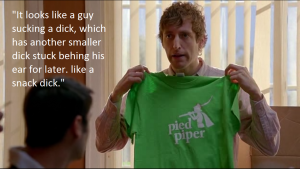 The characters in Silicon Valley are the epitome of more than meets the eye (pun intended!) They’re a bunch of dorks huddled together under one roof chasing the dream of becoming the next big thing. While the show itself is an expert in the field of technology, it never punishes the viewer for not being one. In fact, the characters often feed us layman’s terminology in passing so they can spend the brunt of the episodes fighting amongst themselves, often times resorting to childish tactics such as crude name-calling, crude jokes and crude pranks. But it’s believable, because these are five socially awkward or socially inappropriate dudes who act like they’re chick magnets but choke whenever one stumbles into the equation. Who brag about their great ideas but lack the courage to see them through. Who, collectively, have enough smarts to turn their dreams into a reality, but can’t apply the same logic used for coding to real life. Thus the gang repeatedly takes one step forward followed by two brutal steps back. It becomes heartrending to watch such a worthy, capable group shoot themselves over and over and over again in the foot. If you’ve ever wondered how many shots it takes to kill a dream, you should definitely watch and find out for yourself.
The characters in Silicon Valley are the epitome of more than meets the eye (pun intended!) They’re a bunch of dorks huddled together under one roof chasing the dream of becoming the next big thing. While the show itself is an expert in the field of technology, it never punishes the viewer for not being one. In fact, the characters often feed us layman’s terminology in passing so they can spend the brunt of the episodes fighting amongst themselves, often times resorting to childish tactics such as crude name-calling, crude jokes and crude pranks. But it’s believable, because these are five socially awkward or socially inappropriate dudes who act like they’re chick magnets but choke whenever one stumbles into the equation. Who brag about their great ideas but lack the courage to see them through. Who, collectively, have enough smarts to turn their dreams into a reality, but can’t apply the same logic used for coding to real life. Thus the gang repeatedly takes one step forward followed by two brutal steps back. It becomes heartrending to watch such a worthy, capable group shoot themselves over and over and over again in the foot. If you’ve ever wondered how many shots it takes to kill a dream, you should definitely watch and find out for yourself.
It’s brutal, and honest, and funny, and the struggle seems all too real. You’ll spend most of your time cursing at the screen while the characters curse at each other. But that’s the great thing about conflict and the resulting tension—it makes the viewer press forward, determined to see such a mess through to its resolution.
Like a quest, I guess—don’t leave that thing hanging!
The Unbreakable Kimmy Schmidt
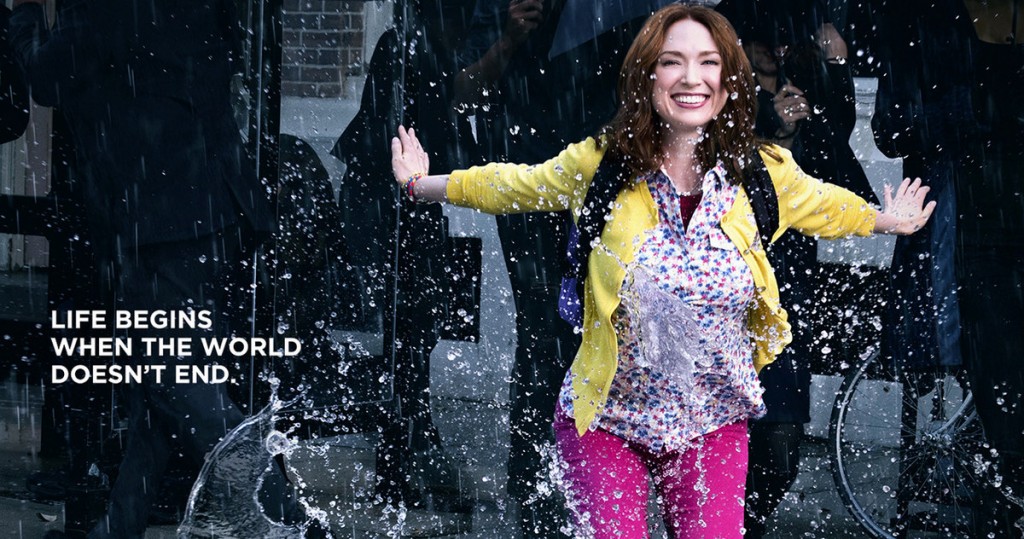 I honestly didn’t know what this show was. I didn’t even know it was a show. Thought maybe it was a documentary or something.
I honestly didn’t know what this show was. I didn’t even know it was a show. Thought maybe it was a documentary or something.
Yeah, don’t judge a book by its cover.
My wife was interested in this one, so we gave it a whirl, and I wasn’t disappointed. Actually, I was quite surprised. I wasn’t expecting a smart comedy which toyed with pop culture clichés. But that’s what I got.
So…
What can you learn?
—Humor/Satire
—How to Know the Rules and Break Them
—Writing Strong Supporting Characters
The characters in TUKS are greatly exaggerated, and I love that about them. They’re fun and lively, and in an age when everything’s trying to be serious and depressing, it’s a wonderful escape, especially if you have issues in real life, which many of us do.
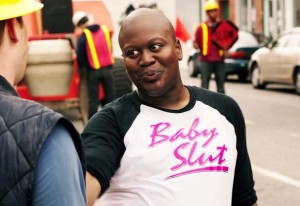 While I don’t necessarily like or root for Kimmy, at least she’s serviceable as the protagonist. I believe her supporting cast is what really saves the day. I’ve come to love Kimmy’s over-the-top, gay roommate Titus Andromedon (give him a quick glance on Buzzfeed right here). His character starts off a touch annoying, but as he transitions from a fame-whore to an actual friend, it’s hard not to love this guy. Same with Jacqueline Voorhees, a rich and insecure Manhattanite who hires Kimmy to be her nanny. It helps that Tituss Burgess and Jane Krakowski really nail these parts. Hoping Titus wins that Emmy!
While I don’t necessarily like or root for Kimmy, at least she’s serviceable as the protagonist. I believe her supporting cast is what really saves the day. I’ve come to love Kimmy’s over-the-top, gay roommate Titus Andromedon (give him a quick glance on Buzzfeed right here). His character starts off a touch annoying, but as he transitions from a fame-whore to an actual friend, it’s hard not to love this guy. Same with Jacqueline Voorhees, a rich and insecure Manhattanite who hires Kimmy to be her nanny. It helps that Tituss Burgess and Jane Krakowski really nail these parts. Hoping Titus wins that Emmy!
There’re a handful of other well-crafted and lovable characters, but what makes them so? Well, for starters, they’re stereotypes. The loud and proud homosexual. The rich guy’s wife who requires an IV loaded with money at all times. The Asian who butchers the English language. The spoiled, revolting teen. The writers know exactly how these characters are going to be perceived, so they play on that. For example, in a later episode, the language-butchering Asian drops the act for just a moment to speak a single sentence in perfect English, making sure the viewers know that he knows what’s actually going on (similar to how Kevin Spacey breaks the 4th wall in House of Cards). There are other instances like these which do what every great satire should—make a spectacle out of the flaws in our system, and our disorganized values, and the way different people treat each other. A great satire gets head bobbing and viewers saying, “That’s funny, because it’s so true.”
The Blacklist
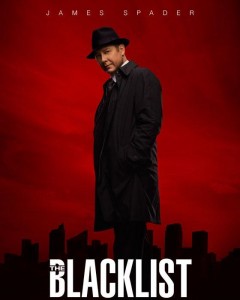 I just started watching this show three nights ago, but I’m already on episode 10, so that says something.
I just started watching this show three nights ago, but I’m already on episode 10, so that says something.
What can you learn?
—Breakneck Pacing
—How to Weave Together Action and Plot
—How to Craft Intriguing Mysteries
James Spader’s great in this role. He reminds me a lot of Bryan Cranston’s Walter White. I’m not able to tell if Spader’s good or bad, and that, in itself, is good. The obvious problem with the show is that the female lead might as well be a cardboard cutout. But hey, I couldn’t act to save my own life, so what do I know?
The gist is, Spader’s character “Red” went from being the FBI’s most wanted to most needed after turning himself in after 20 years on the run, stating that he’s comprised a list of the world’s most dangerous criminals they never knew existed.
The show does a fantastic job of packing the series full of mysteries, even to its detriment. While I enjoy some of them, others seem rather excessive. It’s like explosions—the less I see, the more I enjoy.
But that’s just a minor nitpick. As a whole, the show definitely feeds its viewers equally proportionate meals of action, plot and character—the three major story food groups. I plan to stick with this one to see where everything leads. Hopefully to a satisfying conclusion.
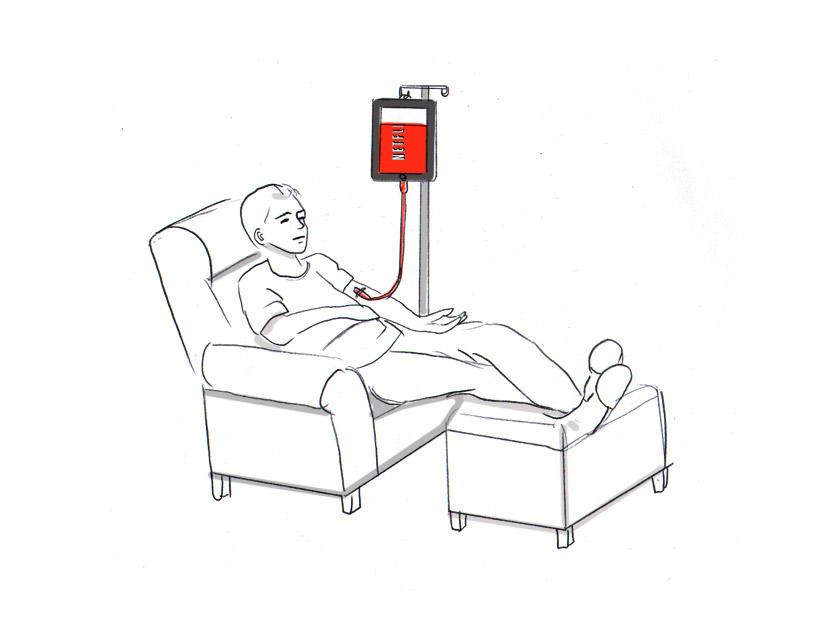
There are numerous other shows I’ve watched, some of which I’ve enjoyed. Some of which I really enjoyed, and then felt betrayed by. And then some which I couldn’t, for the life of me, get into.
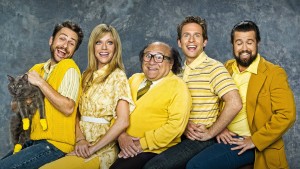 It’s Always Sunny in Philadelphia: I liked season 1, felt it went downhill for the next few seasons, unsure what it wanted to be, then during the 4th or 5th season, it really found its voice and managed to get better. Much better. I’m glad I gave this outlandish, laugh-out-loud mess a chance to mature, because it truly is a great show.
It’s Always Sunny in Philadelphia: I liked season 1, felt it went downhill for the next few seasons, unsure what it wanted to be, then during the 4th or 5th season, it really found its voice and managed to get better. Much better. I’m glad I gave this outlandish, laugh-out-loud mess a chance to mature, because it truly is a great show.
True Detective (season 1): This is the one I was really digging, and then, with only one episode remaining, I couldn’t help but wonder how they were going to wrap everything up. My nagging suspicions came true after watching that dreadful departure of a finale which fell so clumsily into the potholes the series had been so cleverly avoiding since the get-go. I felt slighted by the entire thing. Don’t get me wrong, there was a great story set into motion, but it really needed a few more episodes to really end. I honestly don’t get the love for this one.
Orange is the New Black: I used to watch soap operas back in the day with my mom. Quick shout out to Days of Our Lives and Passions! So naturally, I felt at home with this one. It’s a nice take on the incarcerated female perspective, but it felt a little too campy. Plus I grew to hate Piper, her annoying-as-shit girlfriend from That ‘70s Show, and her pie-banging boyfriend from American Pie. You know what, everyone and everything else in the show is way more interesting than those three. I don’t hate this one—it can be enjoyable at times while tolerable at others—but I just don’t care enough to see what happens in season 3 because I feel like I already know—nothing will happen except the passing of time.
The Americans. Well-done spy thriller set during the Cold War which can be both exhilarating at times and painfully slow at others. The acting it top notch. The threat of consequence equally so. Nothing really bad to say here.
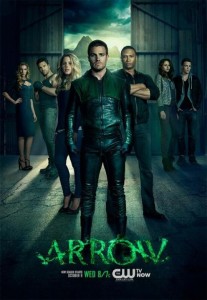 Don’t even get me started on Arrow. The first season, while it had its issues, came to a pretty satisfying conclusion. But after season 1? Man, what a train wreck. Let’s just say this—during season 1, Arrow surfaces after being shipwrecked and presumed dead for five years. From there, we see how his life unfolds in the present along with flashbacks to his past on the island. Fine. He crashed on an island and we get to see the hopelessness he endured. Cool. I can dig it. But the past begins to expand along with the series. In season 2, we find out that Oliver went from an island to an oil tanker. In season 3, the oil tanker to Bangkok? In season 4, before wandering home to tell his loved ones, “Hey, guys, I’m alive!” he traveled all around the world, basically working as a suicide squad member. It became ridiculously far-fetched, which is a shame, because we’re talking about a pretty lackluster dude who wears a cowl and shoots crime in the face with arrows. Which is also funny, because at first Oliver kills crime like they’re ants crawling all over his city, then when he later has a sudden change of heart (Oops, think I’ve been doing this crime thing all wrong!), he hunts down and apprehends those who attempt to handle justice the same way he did. His conclusion?
Don’t even get me started on Arrow. The first season, while it had its issues, came to a pretty satisfying conclusion. But after season 1? Man, what a train wreck. Let’s just say this—during season 1, Arrow surfaces after being shipwrecked and presumed dead for five years. From there, we see how his life unfolds in the present along with flashbacks to his past on the island. Fine. He crashed on an island and we get to see the hopelessness he endured. Cool. I can dig it. But the past begins to expand along with the series. In season 2, we find out that Oliver went from an island to an oil tanker. In season 3, the oil tanker to Bangkok? In season 4, before wandering home to tell his loved ones, “Hey, guys, I’m alive!” he traveled all around the world, basically working as a suicide squad member. It became ridiculously far-fetched, which is a shame, because we’re talking about a pretty lackluster dude who wears a cowl and shoots crime in the face with arrows. Which is also funny, because at first Oliver kills crime like they’re ants crawling all over his city, then when he later has a sudden change of heart (Oops, think I’ve been doing this crime thing all wrong!), he hunts down and apprehends those who attempt to handle justice the same way he did. His conclusion?
“It’s wrong! You can’t kill people like I used to! Goddamn, I wish I could shoot you through the face, but I’m different now, so I’ll just break your leg and drag you to jail by the severed stump!”
In closing, you can learn a lot from these shows. Even what not to do. You just have to go in with a critical eye. Figure out how the shows you love make you feel that way. How do they tear certain emotions out of you? What drew you in in the first place? Answer the questions to how you became a fan and then turn around and apply the same principals to your writing. You’ll definitely grow and become all the better for it.
Until next time, best of luck!

Leave a Reply